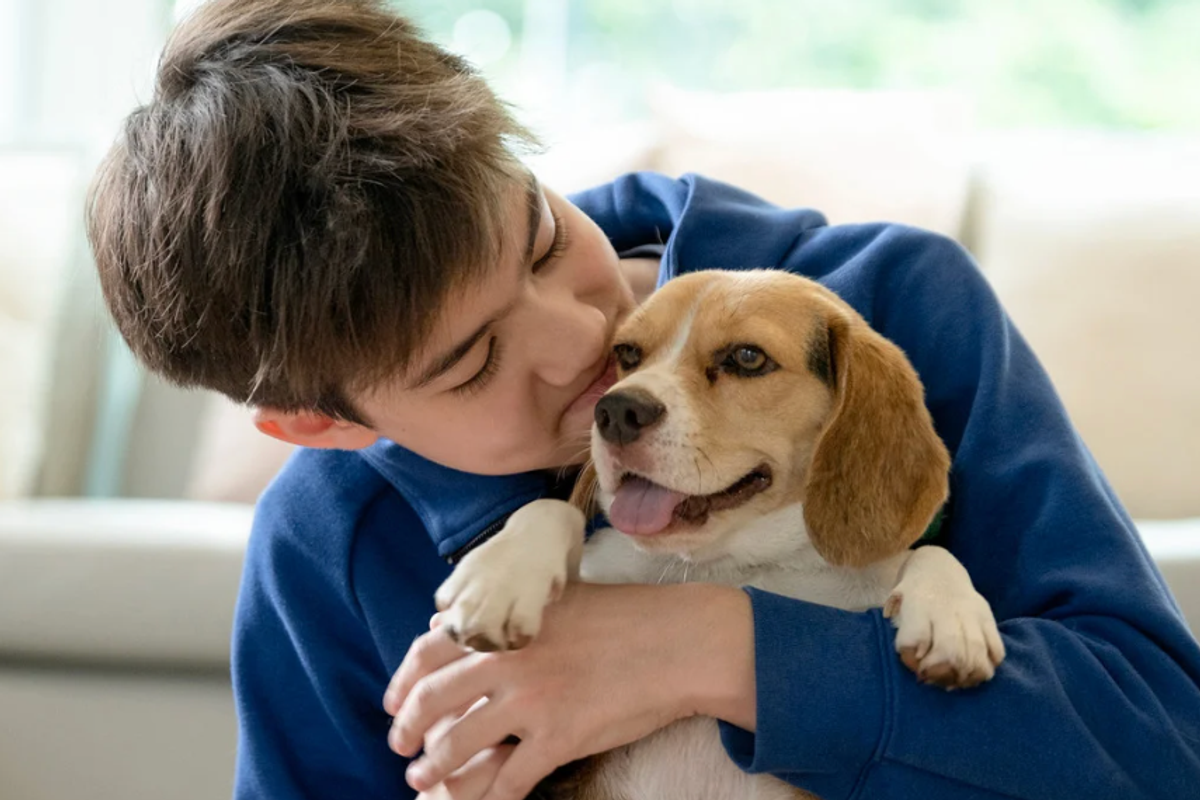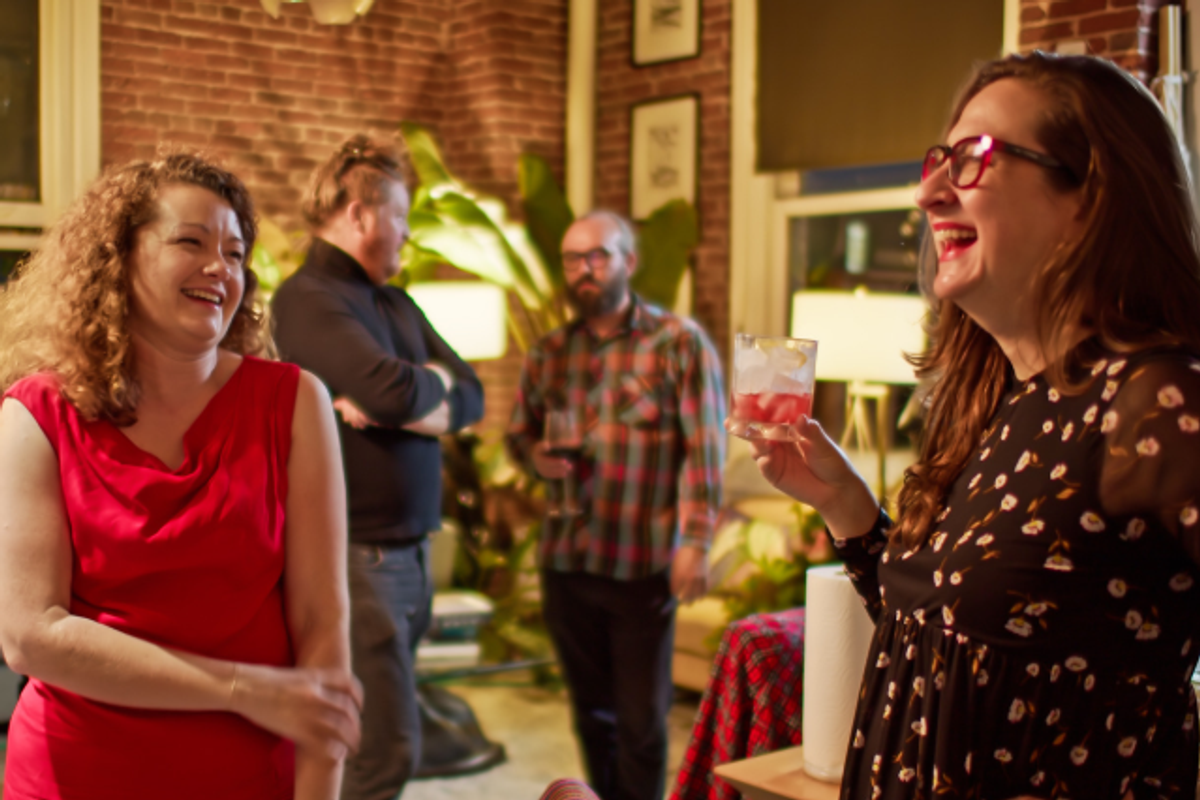For these parents who lost their daughter on 9/11, life couldn't stop. They also had a son.
Finding purpose after the loss of a child.
The Cottoms were a pretty typical American family before Sept. 11, 2001. Clifton and Michelle were the parents of two wonderful kids: Isiah and his younger sister, Asia. The kids were close, and the foursome was a family unit that was full of love and life.
All photos from Michelle and Clifton Cottom, used with permission.
But all of that changed on one heartbreaking day.
When Asia was just 11 years old, her life was cut tragically short.
A passenger on United Flight 77, headed to California for a school field trip, Asia died when the plane crashed into the Pentagon.
Michelle, an equal employment opportunity officer for a federal agency in Washington, D.C., and Clifton, a behavioral technician with the District of Columbia Public System, were suddenly faced with every parent's worst nightmare: a life without their child. And to say that her brother, who was 17 at the time, was devastated would be a gross understatement.
Following Asia's death, the Cottoms' lives changed in an instant.
No parent imagines losing a child — and so no parent is prepared to move on in life without her. In the blink of an eye, the Cottoms, still parents to 17-year-old Isiah, had to learn to function in a whole new way.
"We just went through the motions," Michelle said about their lives immediately following the plane crash. They faced life by waking up and taking each minute as it came. "We tried to make some sense of what was really going on," she shared.
Despite being a big brother with a hole in his heart, Isiah was a source of strength for his parents. And that strength helped them with their own grief.
“They played, laughed, and cried together," Michelle told me of Isiah and Asia's relationship.
Isiah was a rock for his parents, even while grieving the loss of his best friend. "He helped his father get closer to God by illustrating his faith," Michelle said. "Isiah dropped to his knees and immediately began to pray when we told him about the plane crash."
Michelle and Clifton admired the amount of strength and maturity their son possessed at the young age of 17.
Losing a child is hard enough. Losing a child to an act of terrorism that is the center of national attention adds another layer of complexity.
"When a tragic world event such as 9/11 occurs, it riddles individual families with unimaginable trauma and pain," Dr. Fran Walfish, a relationship psychotherapist and author of The Self-Aware Parent, told me.
Like many Americans who were devastated by the atrocities committed on 9/11, some of Isiah's peers also experienced feelings of vengefulness. And so just as he had inspired them with his maturity and faith, Isiah's parents helped him deal with the anger, hate, and pain that swirled around him every day.
“He had to deal with the pressure and questions that came to him from his classmates and friends. All of who, just like a lot of Americans, wanted revenge," Michelle recalls. Isiah faced all of these challenges and more with grace and strength.
“We instilled in him that revenge and hate was not an option even though everything around us was going to war."
There is no "new normal."
I asked Michelle if there's any way to settle into a new normal after such a devastating loss. The answer was clear: “Losing a child is not normal, so there will never be a 'new normal.' We live each day one at a time," she explained.
When it comes to parenting, people who have more than one child can't just check out completely when one dies to deal with their own grief. But as Michelle points out, Isiah was 17 and didn't require as much hands-on parenting as a younger child would. Still, even with an older child, there are pitfalls and ways that grieving parents could respond that don't help the child who is left behind.
"The parents had two children and were now left with one," Dr. Walfish noted. "It would be understandable if they held tighter and overprotected their surviving 17-year-old son."
And yet, that wasn't what the Cottoms did. They gave their son room to grow and to grieve. "We always talked to him about his feelings, hurt, pain, anger, and frustrations," Michelle said.
While some parents of younger kids might need to rely on their adult friends and family members to fill in the gaps and nurture their child as they too continue to grieve, Isiah was older and had a meaningful friendship in place to help him through the early stages. During the initial weeks and months following Asia's death, Isiah spent a lot of time with his cousin Mike, who was one year older and with whom both he and Asia had a good friendship.
As time went on and the Cottoms worked through their pain, they were able to arrive at a place together where their daughter and sister remains alive and well in their hearts, minds, and souls.
“We talk about her often and daily," Michelle said. “It is not painful — it is thoughtful and on purpose. Our memories are full of joy not the pain and sting of death."
Following Asia's death on 9/11, the Cottoms received an outpouring of financial contributions.
Many people and places — including schools, churches, boys' and girls' clubs, social clubs, companies, and more — sent money in Asia's name.
“This outpouring of generosity is what motivated us to create a scholarship fund in honor of our daughter," Michelle said. “Asia loved to learn, and even at 11 years old, [she] had big plans to attend college in California to become a 'baby doctor' — a pediatrician."
An added touch of heart-wrenching meaning was found in exactly how people gave: Many of the financial gifts were made in denominations of 11, such as 11 cents, $11, $111, and so on, symbolizing Asia's age at the time of her death.
The result of the generosity of others and the Cottoms is the Asia SiVon Cottom (ASC) Memorial Scholarship Fund, a 501(c)3 charitable organization that was created to honor Asia's life.
“Awards are made to deserving students who excel academically with special consideration given to students interested in math, science, and information technology," Michelle explained.
To date, the Cottoms have awarded over $250,000 in scholarships to students through their fund. “Our ASC scholars are now teachers, nurses, analysts, contract negotiators, engineers, and providing legal services, to name a few," Michelle said.
The Cottoms also wrote a book called "Asia's New Wings: The Untold Story of a Young Girl Lost on 9/11."
“It is a story about Asia's life, passion, legacy, and how to move on after experiencing loss," Michelle said. The book talks about how the Cottom family turned the most tragic thing that could have happened to them into “an opportunity to immortalize Asia and educate a nation."
Book jacket from "Asia's New Wings: The Untold Story of a Young Girl Lost on 9/11."
“We were motivated to write the book because many people keep telling us that we needed to share Asia's story … many had no idea children were lost during the 9/11 terrorist attacks," Michelle shared.
The Cottoms have found that the book not only helps parents who have lost a child, but also those dealing with other types of grief — in addition to allowing them to find “some level of closure" themselves.
“The Bible says a peace that surpasses all understanding. We have learned to accept what God allows whether we like it or not," Michelle said. “We have learned how to live on."
The Cottoms have learned that as time goes on, so does their love.
Losing a child is “unnatural and unfair," Michelle said. Parenting after such tragic loss will forever be an experience that only those who have lost one of multiple children can fully understand. But through their story we see the role that faith, friends, honesty, and love played in helping them all stay whole and make it through.
Today, Michelle says that despite the ways in which their life might seem drastically different, the only thing that's really changed is that Asia is no longer here on earth. They are still her parents. And she is forever their daughter.
“She remains alive and well in the hearts of all who knew and loved her."
- Remember the heroic young 'man in the red bandana' who kept going back to save lives on 9/11 - Upworthy ›
- Paul Veneto is pushing a bar cart 200 miles for 9/11 anniversary - Upworthy ›
- Chalk artists memorialize Flight 93 passengers and crew - Upworthy ›
- A viral post helps explain what to say - and what not to say - to a parent who has lost a child. - Upworthy ›



 A man being licked by a golden retreiver.
A man being licked by a golden retreiver.  A dog's tongue close-up.
A dog's tongue close-up.  A golden retreiver getting their teeth brushed.
A golden retreiver getting their teeth brushed. 
 Curtains can help make a space feel homey and hide bad windows and trim.
Curtains can help make a space feel homey and hide bad windows and trim. Clean and tidy sets a mood.
Clean and tidy sets a mood. Lighting makes a big difference in how your home feels.
Lighting makes a big difference in how your home feels.

 Cathedral-like libraries like the George Peabody Library in Baltimore, Maryland are popular places for creative work.By Matthew Petroff/
Cathedral-like libraries like the George Peabody Library in Baltimore, Maryland are popular places for creative work.By Matthew Petroff/ The Sterling Memorial Library at YaleBy Nick Allen/
The Sterling Memorial Library at YaleBy Nick Allen/
 A woman making eye contact with a man she is speaking to.via
A woman making eye contact with a man she is speaking to.via  A man in a suit with questions.via
A man in a suit with questions.via